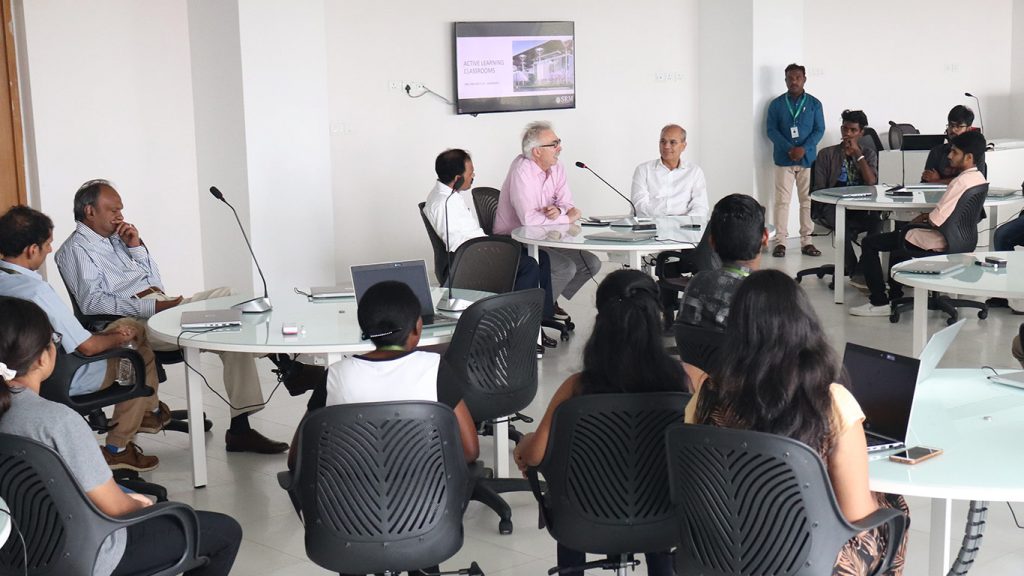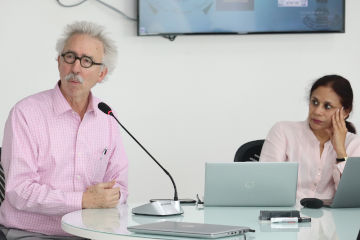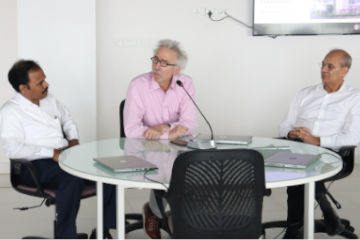 |
Nicholas Dirks, former Chancellor of UC Berkeley and Honorary Pro Chancellor, SRM AP addressed faculty and students on the true meaning of liberal arts pointing out that many of the top corporate leaders attended liberal arts institutions enabling them to think across disciplines and to communicate effectively. “SLABS creates the basis for all students to have a kind of interdisciplinary education and faculty to have a community of scholars to build larger research programs.”
The Comprehensive University
Professor Dirks spoke of the notion of the comprehensive university as a place where the most important innovations and discoveries happen in encounters between curricula, in the spaces between disciplines, each with their own modes of thought and forms of knowledge.
“You never know what the hybrid field is going to be that will generate the really extraordinary discovery. Many new understandings of behavioural economics and risk come out of social psychology. Many important trends in English literature happen because of cultural history.” Dirks pointed out.
Liberal Arts and SLABS

Professor Nicholas Dirks, Professor Janaki Bakhle
Speaking of the philosophy behind liberal arts and SLABS, Nicholas Dirks explained that liberal arts at its best sets the stage for debates whereby students accept that there are different ways of looking at the world, often by people who believe in the empirical record and importance of evidence. “But they also recognize that facts and evidence alone don’t get you to conclusions.” Dirks explained. “That’s where analysis and interpretation comes in. At SLABS we encourage students to discuss, analyse and learn to make a good argument.”
Foundation Courses – New Approaches
Janaki Bakhle, Professor of History at Berkeley emphasised that the traditional approach to teaching liberal arts needs to be re-imagined to stay relevant in a digital age with easy access to information. She demonstrated some proven teaching methods for the foundation courses with a workshop on how the history of India, as an example, can be taught in an engaged, conceptual way whereby students not only grasp the complexities of the subject and gain an enduring understanding of the underlying ideas, they are also able to effectively articulate the same in writing. The cornerstone of this teaching methodology is promoting healthy debate among students on challenging subjects and ideas.
Liberal Arts and Careers

Dr. P. Sathyanarayanan, President SRM AP, Nicholas Dirks, SRM AP Vice Chancellor Dr. Jamshed Bharucha
Another point of discussion with faculty and students was the incremental value foundation courses bring to students towards their understanding across a broad spectrum of disciplines and as they begin their careers.
Professor Dirks pointed out that in the hi-tech sector and even in engineering fields, particularly in entrepreneurial ventures, there is a huge demand for people who have studied philosophy, anthropology, sociology, even English. “Liberal Arts is seen as developing the fundamental set of skills essential for success.”
SRM AP Vice Chancellor Dr. Jamshed Bharucha, reaffirmed the SLABS commitment by saying, “SRM University, Andhra Pradesh, is dedicated to being a new kind of comprehensive, inter-disciplinary university — one that focuses on expanding the minds of our students rather than just getting them to memorize. To that end, we have launched these series of workshops on new forms of teaching and learning.”
Shailender Swaminathan, Associate Dean, SLABS indicated that these workshops would be ongoing as faculty continue to structure, improve and enrich teaching methodology in the liberal arts curriculum.

